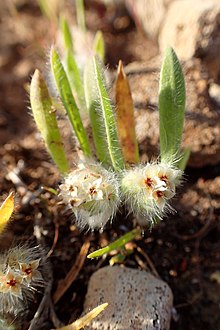| Plantago cretica | |
|---|---|

| |
|
Scientific classification
| |
| Kingdom: | Plantae |
| Clade: | Tracheophytes |
| Clade: | Angiosperms |
| Clade: | Eudicots |
| Clade: | Asterids |
| Order: | Lamiales |
| Family: | Plantaginaceae |
| Genus: | Plantago |
| Species: | P. cretica
|
| Binomial name | |
| Plantago cretica | |
Plantago cretica is a species of plant in the family Plantaginaceae known by the common name Cretan plantain.
It is a tumbleweed, [1] densely tufted annual plant. The leaves are in basal rosette, entire, narrow-linear and woolly, upright, to 15 cm. The inflorescences and short flowering stalks are densely creamy to brown-hairy, curling downwards after flowering to form a dense mass at the base of the plant. Flowering from March to May. [2]
Dry, sandy and rocky soils.
This Mediterranean species is native to Greece ( Aegean islands and Crete), Cyprus, Israel, Lebanon, Syria, Turkey. It has been introduced in Australia.
- ^ W. F. Ganong (1896). "An outline of phytobiology". Bulletin of the Natural History Society of New Brunswick. 13: 3–26, page 1 errata. page 16
-
^ "Wonders at our feet". 2013.
{{ cite journal}}: Cite journal requires|journal=( help) [1]
| Plantago cretica | |
|---|---|

| |
|
Scientific classification
| |
| Kingdom: | Plantae |
| Clade: | Tracheophytes |
| Clade: | Angiosperms |
| Clade: | Eudicots |
| Clade: | Asterids |
| Order: | Lamiales |
| Family: | Plantaginaceae |
| Genus: | Plantago |
| Species: | P. cretica
|
| Binomial name | |
| Plantago cretica | |
Plantago cretica is a species of plant in the family Plantaginaceae known by the common name Cretan plantain.
It is a tumbleweed, [1] densely tufted annual plant. The leaves are in basal rosette, entire, narrow-linear and woolly, upright, to 15 cm. The inflorescences and short flowering stalks are densely creamy to brown-hairy, curling downwards after flowering to form a dense mass at the base of the plant. Flowering from March to May. [2]
Dry, sandy and rocky soils.
This Mediterranean species is native to Greece ( Aegean islands and Crete), Cyprus, Israel, Lebanon, Syria, Turkey. It has been introduced in Australia.
- ^ W. F. Ganong (1896). "An outline of phytobiology". Bulletin of the Natural History Society of New Brunswick. 13: 3–26, page 1 errata. page 16
-
^ "Wonders at our feet". 2013.
{{ cite journal}}: Cite journal requires|journal=( help) [1]